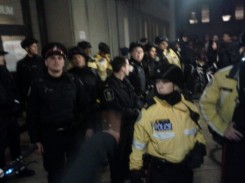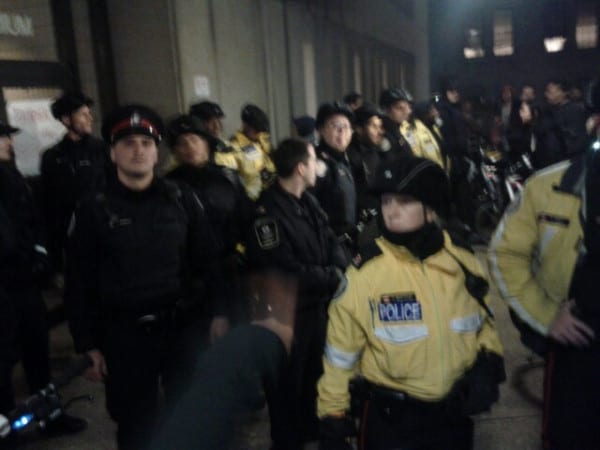Senior administrators at the University of Toronto and the University of Toronto Students’ Union (UTSU) continue to debate the acceptable limits of free speech on campus in the aftermath of a lecture delivered in late November by Dr. Warren Farrell.
The lecture was marked by a sizable protest and heavy police presence, during which a group of protestors blocked the entrance to the lecture hall where Farrell was scheduled to speak.
“We have at the University of Toronto a wide range of contentious events, in which views are expressed that are offensive to some,” said Provost Cheryl Misak in a December 11 statement. “Our primary aim with respect to these events is to ensure that freedom of speech is protected, including the freedom to protest, as long as the law is respected.”

Police formed a cordon in front of MacLeod auditorium during parts of Farrell's lecture. Q_E_D/TWITTER
In a dueling statement released in the days following Farrell’s lecture, the UTSU condemned the event. “Despite complaints to the University administration, and requests from students to maintain our campus as a safe space free from oppression and discrimination, Dr. Farrell was given a space and forum to spread his misogynistic, hateful theories at U of T,” read the union’s release.
Farrell was invited to speak on campus by a group called Men’s Issues Awareness at the University of Toronto (MIAUT). The group is listed as a registered student club with ULife. Its mission is described as “consciousness-raising, public education and efforts to change public policy” in relation to “men’s issues,” and the group pledges “positive activism to advance a healthier society” and “the highest level of co-operative dialogue with other campus and community organizations engaged in activities of similar aims and goals.” Calls to the contact number listed on MIAUT’s ULife profile were routed to the voicemail inbox of the Canadian Association for Equality, an organization whose name appeared prominently on posters promoting Farrell’s lecture.
UTSU executives said the union had been in contact with the administration to express their concern over the club since early last fall. In spite of the union’s stated opposition, Farrell’s lecture was approved by the Office of Student Life, which vets potentially controversial speakers before they can speak on a U of T campus.
Through a spokesperson, the university declined to elaborate on the vetting procedure in place. Misak’s December 11 release stated in part that “the vast majority of the University of Toronto community understands that freedom of expression is vital to the mission of universities and cannot be reserved for those with whom one agrees.”
In the weeks since the event, the UTSU has urged the administration to make the vetting procedure more stringent. “I support free speech, but there is no right without its limitation,” said UTSU president Shaun Shepherd. “In this case, it’s obvious that [Dr.] Farrell had overstepped that limit a few times, not through what he was saying at the lecture, but the content of his other speeches and books, and the way he approaches these issues. It is sexist at the core.”
Shepherd said he was “ashamed” that the university “keeps poking at this free speech claim.” Misak’s statement concerning Farrell’s lecture suggested that “the disruption of this event by protesters was a threat to free speech.”
“The way I’m viewing this is a test of the clause of these limits. If this isn’t the limit, then what is it? How far can someone go? I strongly believe this has been a breach of the university’s own policy,” said Shepherd. The union has urged the university to “use the [Ontario] Human Rights Code as a guideline in identifying events that may create an unsafe space for its students, staff and faculty.”
The university’s “Statement on Prohibited Discrimination and Discriminatory Harassment” cites the Ontario Human Rights Code as one of several “foundational” documents, but also stipulates that within the university’s context, free speech is “the most crucial of all human rights.” A separate document, the “Statement on Free Speech,” adds that “there are limits to the right of free speech” referring specifically to instances “when members of the University use speech as a direct attack that has the effect of preventing the lawful exercise of speech by members or invited guests.”
“We want to ensure that events the university is promoting or allowing should fall in line with the general ethos of the university,” Shepherd said.
“Current policies don’t account strictly enough for situations where students become at risk under the guise of freedom of expression,” said UTSU vice-president, equity, Noor Baig. “In my view, a lot of clarifications around violent language and hate speech need to be made in policies and upheld in practice.”
As this debate over free speech has unfolded, a website called “A Voice for Men” has singled out several female protestors who were among the approximately 100 people who disrupted Farrell’s lecture in November. Three students, including former UTSU president Danielle Sandhu, have been the subject of vitriolic blog posts. The group has also added two students to an online registry hosted on register-her.com, which publishes the names of women it labels variously as “bigots” and “false rape accusers.”
A Voice for Men has been described by the Southern Poverty Law Center as “woman-hating” and a focal point in an expansive misogynistic online network. Contacted for comment, Farrell said he has “no affiliations with AVfM, and only a hearsay understanding of what they have done.”
The posts on “A Voice for Men” include photos and other personal information gathered from Facebook and Twitter feeds. Although the site claims that the posts do not advocate or endorse violence, those targeted described receiving threatening emails and phone calls, “surveillance” on campus, and other acts of intimidation and harassment.
“Unfortunately, when contentious issues, such as this one, spill into the world of blogs and internet participation and increasingly involve individuals external to our community, they can very quickly escalate. That has happened in this situation and has resulted in the vilification of a very small number of individual students,” read
Misak’s statement.
The UTSU confirmed that it has been documenting these cases of threats and harassment, and that this documentation has been shared with both the university administration and campus police. “We believe that there must be some member of the U of T community fueling this online witch hunt,” said Shepherd.
“There is no ambiguity here, the Men’s Issues Awareness group and its national affiliate organization, the Canadian Association for Equality (CAFE) are part of the same broader ‘movement’ as ‘A Voice For Men’,” said Baig. “In fact the CAFE website previously hosted a number of links to AVfM which have more recently been taken down, most likely to feign dissociation.”
“I think it’s fairly clear that there are individuals within the university community with access to locally obtained information who are relaying this information, perhaps even composing the posts themselves,” Baig added.
Baig said that the union attempted to raise the issue of targeted individuals and compromised student safety at a meeting with university administrators on November 28, but the issue was not deemed urgent enough at the time to merit discussion. The topic was raised again at a December 4 meeting. Baig said it was not until after this second meeting, on December 11, that Provost Misak released her statement (quoted from above), “in which the safety of students seemed to only have been a minor issue on the side.”
In the December 11 statement, Misak wrote that the university “takes these threats seriously and we condemn them. We have reached out to individual students, and will continue to do so, in order to assist them in developing safety plans so that they may go about their academic and other endeavours on our campus safely.” A subsequent statement, released on December 20 and signed by Angela Hildyard, vice-president, human resources and equity and Jill Matus, vice-provost, students, reiterated that the university “deplores” the targeting of individuals and communities, and promised to take legal action as appropriate.
Warren Farrell on Campus
Warren Farrell is a controversial figure whose published works include The Liberated Man, Why Men Are the Way They Are, and The Myth of Male Power. On his visit to U of T campus in November, he gave a speech outlining his theory of how men are disadvantaged in Western society.
Topics discussed during Farrell’s lecture included suicide rates among veterans, custody battles in family court, video game and pornography addiction, rates of male unemployment and underemployment, and violent sports. Farrell describes himself as a former feminist, and the only male ever to have been elected to the Board of the National Organization for Women three times. He began to include men’s issues in his work about gender in the mid-1980s.


